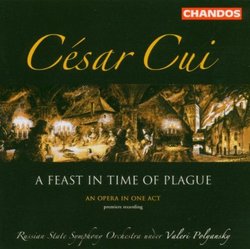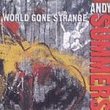| All Artists: Andrei Baturkin, Cesar Cui, Valery Polyansky, Ludmila Kuznetsova, Russian State Symphony Orchestra, Tatiana Sharova, Alexei Martynov, Alexei Martinov Title: CÚsar Cui: A Feast in Time of Plague Members Wishing: 0 Total Copies: 0 Label: Chandos Release Date: 6/29/2004 Genres: Pop, Classical Styles: Vocal Pop, Opera & Classical Vocal Number of Discs: 1 SwapaCD Credits: 1 UPC: 095115120125 |
Search - Andrei Baturkin, Cesar Cui, Valery Polyansky :: CÚsar Cui: A Feast in Time of Plague
 | Andrei Baturkin, Cesar Cui, Valery Polyansky CÚsar Cui: A Feast in Time of Plague Genres: Pop, Classical
|
Larger Image |
CD DetailsSimilar CDs
|
CD ReviewsFor Russophiles, a more than worthwhile effort Lyle Neff | Newark, Delaware, USA | 07/19/2004 (5 out of 5 stars) "This is a most welcome CD -- at least for this writer, who has admired the music and career of Cesar Cui for many years. This would seem to be the first complete commercial recording of an opera by Cui -- a CD of his children's opera "Puss-in-Boots" (as "Der gestiefelte Kater") was issued in Germany several years ago, but a portion of the dances was cut, and the whole was restyled for radio, with overdubbing by spoken voices. Granted, the opera presented here is barely longer than 30 minutes, but "Feast in Time of Plague" provides an excellent introduction to Cui the opera composer. This selection also now completes our audio access to all four of the operas taken from Pushkin's "Little Tragedies," the others being Dargomyzhsky's "Stone Guest," Rimsky-Korsakov's "Mozart and Salieri," and Rachmaninoff's "Miserly Knight." Cui held Pushkin in most high regard; indeed, besides composing dozens of songs to Pushkin's poems, Cui's first and last operas, "Prisoner of the Caucasus" and "The Captain's Daughter," were derived from the great Russian poet's works. Hopefully more of Cui's opera music will emerge in coming years, his arguable masterpiece "William Ratcliff" (premiered in 1869) being the most desired by this particular writer.As the selection of works on the CD suggest, Cui was first and foremost a composer for the voice. Although not anything near a virtuoso orchestrator like Tchaikovsky or Rimsky-Korsakov, his handling of the orchestra to enhance the dramatic or emotional condition presented in the sung text is quite convincingly realized here in these performances. Cui believed that the orchestra in opera should enhance the text and dramatic situation, but not to overpower the voice or make it insignificant (as he judged was the case with Wagner's music dramas); this musical stance certainly comes through in all the vocal works on this recording. This may explain why the orchestral writing in these vocal works seems stronger than in the three orchestral scherzos on the CD. The latter, while quite charming and conscientiously rendered by the performers, make much less of an impact, as do other orchestral selections by Cui that have been made available in recent years. It is as if the lack of a vocally rendered text somehow reduced the composer's degree of inspiration from the muse of orchestration, or even of composition. (Rimsky-Korsakov distinguished between excellent capacity for orchestration and excellent capacity for composition for orchestra; perhaps Cui was not quite capable of either.)It is difficult, yet not even necessary, to detect profundity in Cui's concert music for orchestra (as opposed to the orchestral moments in the operas -- those in "Feast," for instance, are quite effective for their dramatic import). The fact that he never composed a symphony, symphonic poem, or concert overture of some type would support this contention, although one should not conclude that this music is not heartfelt or sincere. His purely instrumental music comes off much better in the chamber varieties -- numerous pieces for piano, three string quartets, a violin sonata, other works for solo instrument and piano, etc.Nevertheless, Cui's most moving music uses the voice: he composed hundreds of songs and romances, mostly in Russian, but also several solos in Polish and German, and many in French (his father's native language), and, of course, six full-length operas, a one-act comic opera ("The Mandarin's Son"), three short musical dramas (including "Feast"), four children's operas, and the first act of the collaborative opera-ballet "Mlada" from 1872. The cause of promoting Cui's music for voice and orchestra -- and demonstrating how good it is -- is well served by this recording. I resoundingly applaud the singers, instrumentalists, and conductor for making this effort." Very impressive David Chandler | 05/15/2005 (5 out of 5 stars) "Cui is one of those composers who is nowhere near as bad as he is sometimes said to be. He was a member of one of the most exciting groups of young composers ever to assemble, the Russian "Five" (the others being Balakirev, Borodin, Mussorgsky and Rimsky Korsakov), and undoubtedly lacked some of the fire and originality of the others. That said, his best music is very listenable, and this CD contains the best available. I bought it more from curiosity than anything else, as with other Cui releases, but was most pleasantly surprised by the quality of the main work, the opera, which is taut, urgent, and exciting--and with all respect to Pushkin, this has more to do with Cui's music than the words. Cui even produces themes here which you find yourself humming several days after hearing them. A serious case for Cui's interest as an opera composer has been established with this release and it is certainly to be hoped that other Cui operas will be recorded soon. All serious lovers of Russian opera will hope that the next one is "William Ratcliff," as that was central not only to Cui's development as a composer, but to the emerging ideals of the "Five" in the 1860s." CUI BONO? **** | **** | 09/18/2004 (4 out of 5 stars) "I could not help myself but indulge in this cui-osity.
As a self-confessed collector of russian classical music it has interest.It brings us back to the bygone age when Russia was an empire and its culture was a part of the european mainstream tradition, for that it has its charms and sentimental value. Far from being earth-moving or extravagant it tends to blandness and a narrow dynamic range but makes up for it in sensitivity of music to text and its overall lightweight easily digestible oldworld manner. For Russians this is part of their cultural heritage and should be better known precisely because for 70 years it along with so much other music was deemed not 'socialist realist' enough and irrelevant to their society. Chandos have done a great service in illuminating this music and filling in for us the missing pieces of Russian cultural history. Thankyou Chandos. " |

 Track Listings (7) - Disc #1
Track Listings (7) - Disc #1
